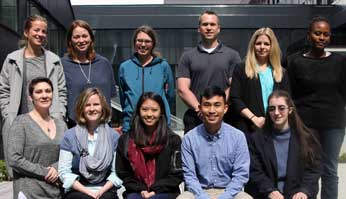 KINGSTON, R.I., June 3, 2015 – Norway is famous for its fjords, midnight sun and Nobel Peace Prize, but did you know it has another claim to fame? It’s the best country in the world to grow old.
KINGSTON, R.I., June 3, 2015 – Norway is famous for its fjords, midnight sun and Nobel Peace Prize, but did you know it has another claim to fame? It’s the best country in the world to grow old.
A very young group of University of Rhode Island students explored that fact and more during a weeklong trip last month to Norway’s Bergen University College to study aging and health care among the elderly.
The trip was the culmination of an online course co-taught by Phillip Clark, a URI gerontology and human development professor who also went. Clark got hooked on Norway as a Fulbright scholar in 2007 and has been back many times to do research or travel with his family.
The class was funded by the Norwegian Centre for International Cooperation in Education and is linked to a “cluster” initiative supported by the URI Provost’s Office that focuses on aging and health issues examined worldwide by scholars from different disciplines.
What made the trip especially memorable is that URI students, from different health professions, teamed up with students from Norway and Canada to talk about what each country is doing to help older people stay healthy and happy.
The URI students who participated were Catherine Liu, of Narragansett, a pharmacy major; Brandi Parker Cotton, of Providence, a nursing student; and Phillip Chang, of Tewksbury, Mass., a physical therapy student. They were joined by Morgan Malloy, who is studying social work at Rhode Island College.
URI’s Marketing and Communications Office talked with Clark, director of the URI Program in Gerontology and the Rhode Island Geriatric Education Center, about why Norway treats its elderly so well, the benefits of collaborating with students from other countries, and those magical fjords.
Norway is the best place in the world for older people, according to Global AgeWatch’s index of the quality of life in 96 countries. Why?
Successful aging requires a lot of different factors, and Norway seems to do well on all of them. For example, older Norwegians have high-income security through a generous universal pension system. They also benefit from a health care system that supports all Norwegians from the time they are born.
What’s the ranking in America for the elderly?
The United States ranks 8th, behind some of the other Scandinavian countries, Germany and Canada, but ahead of the UK and France.
Why are we so far behind?
We score relatively low on two key indicators: Many older Americans try to make ends meet with only their modest Social Security benefits, which are not adequate without another pension or retirement savings. We also don’t have adequate health care provided to Americans under age 65, so many people get to old age without having a lifetime of access to good health care.
Do Norwegians pay high taxes to provide great social benefits for the elderly and others?
Yes, although their high tax rate really provides a lifetime of support when they need it. For example, college students in Norway do not have to pay tuition, and both moms and dads get a generous parental leave benefit when they have children.
Wow, free tuition. This must put students on the same playing field.
Yes, both during the course of their lives when they are working, and also at the time of retirement. We know that well educated people do better in old age.
URI students studied with Norwegian and Canadian students on the trip. What’s the benefit of that collaboration?
They learned an enormous amount about the similarities and differences in health care services for older adults in different countries. The experience highlighted the fact that aging is a global issue, and different countries respond to the challenges of growing numbers of older adults differently.
Why is it so important for students from different fields to work together on aging issues?
Health care for older adults increasingly requires an interprofessional team of different types of providers to give high quality care. The students learned some basic knowledge and skills that will be needed to work together in geriatrics.
What got students charged up during the trip?
The beautiful scenery of Norway, of course, but also seeing firsthand the innovative programs and settings being developed for older adults that are different from those in the United States. Some programs include having sheep and chickens at a nursing home for the residents to interact with, and placing older adults with dementia on small working farms to participate in activities they remember from childhood.
You’ve been to Norway five times in the last decade. You must love the country. Why is it so alluring? Take us through the fjords.
It’s hard to describe the feeling you get from being on the side of a mountain looking out over the expanse of a fjord. The Norwegian tourist office says that “Norway is powered by nature,” and that’s absolutely true!
Photo above: University of Rhode Island students and international students at a weeklong trip to Norway last month to study aging and health. URI students, top row, third from left: Brandi Parker Cotton. Bottom row, third from left: Catherine Liu; fourth from left, Phillip Chang; fifth from left, Morgan Malloy. Photo by Hilde Haaland-Kramer.

